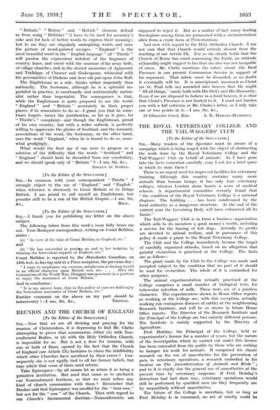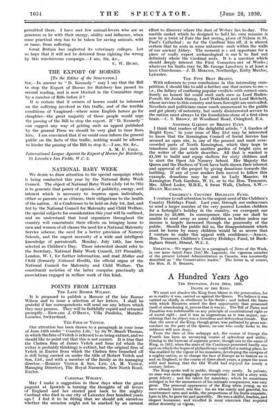THE ROYAL VETERINARY COLLEGE AND THE TAIL-WAGGERS' CLUB
[To the Editor of the SPECTATOR.] SIR,—Many readers of the Spectator must be aware of a campaign which is being waged with the object of obstructing the work done by the Royal Veterinary College and the Tail-Waggers' Club on behalf of animals. As I have gone into the facts somewhat carefully, may I ask for a brief space in which to state them ?
There is an urgent need for improved facilities for veterinary training. Although this country contains many more animals than human beings, it has only four veterinary colleges, whereas London alone boasts a score of medical schools. A departmental committee recently found that "the condition of the Royal Veterinary College is a national disgrace. The building . . . has been condemned by the local authority as a dangerous structure. At the end of the current year the Governing Body will have exhausted all its funds."
The Tail-Waggers' Club is in form a business organization which sells to its members a good money's worth, including a service for the tracing of lost dogs. Actually its profits are devoted to animal welfare, and in pursuance of this policy it made a grant to the Royal Veterinary College.
The Club and the College immediately became the target of carefully organized attacks, based on an allegation that painful vivisection is practised at the College. The facts are as follows : The grant made by the Club to the College was made and accepted subject to the condition that no part of it should be used for vivisection. The whole of it is earmarked for other purposes.
The .animal experimentation actually practised at the College comprises a small number of biological tests for tubercular infection of milk. These tests are of a painless character. The experimenters shown in Home Office reports as working at the College are, with this exception, actually working (on contagious diseases of cattle) at the neighbouring Research Institute, and will be so shown in future Home Office reports. The Director of the Research Institute and the Principal of the College are two entirely different persons. The Institute is mainly supported by the Ministry of Agriculture.
Prof. Hob:lay, the Principal of the College, held sr experimenter's licence for a number of years, but the nature of the investigation which he carried out under this licence has been concealed from the public by those who are seeking to hamper his work for animals. It comprised his classic research on the use of anaesthetics for the prevention of pain in veterinary operations, a research embodied in his treatise on The Anaesthetization of Animals and Birds" ; and to it is chiefly due the general use of anaesthetics at the present time by veterinary surgeons. If Prof. Holiday's detractors had had their way, veterinary operations would still be performed by qualified men (as they frequently are by unqualified) without anaesthetics.
The future of the College is uncertain, but so long as Prof. Hobday is in command, no act of cruelty could be
permitted there. I have met few animal-lovers who are as generous as he with their energy, ability and influence, when some practical step has to be taken for saving animals, wild or tame, from suffering.
Great Britain has neglected its veterinary colleges. Let us hope that it will not be deterred from righting the wrong by this mischievous campaign.—I am, Sir, &c.,
C. W. HUME.



















































 Previous page
Previous page